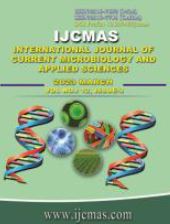


 National Academy of Agricultural Sciences (NAAS)
National Academy of Agricultural Sciences (NAAS)

|
PRINT ISSN : 2319-7692
Online ISSN : 2319-7706 Issues : 12 per year Publisher : Excellent Publishers Email : editorijcmas@gmail.com / submit@ijcmas.com Editor-in-chief: Dr.M.Prakash Index Copernicus ICV 2018: 95.39 NAAS RATING 2020: 5.38 |
Transplanting the paddy nursery in the rice field prepared after repeated puddling; is the conventional method of rice (Oryza sativa) cultivation in India which is not only intensive water user and nutrients uptake but awkward and laborious also. Some of the problems like lowering water table, scarcity of labour during peak periods, deteriorating soil health demands are arises to sustain productivity of rice as well as natural resources. There are some problems/constraints associated with adoption of DSR which can be solved by capacity building of farmers through conducting demonstrations, kisan goshthies, kisan melas exposure visits and farmers-scientists interaction for promotion of DSR for its successful adoption as well as extension personnel working in the extension system for transfer of technology. Keeping the above facts in consideration, a case study was conducted in the adopted nine districts of Haryana State. The district level training-cum workshop was organized (one in each district). The data revealed that a total of 2911 farmers/farmwomen (2268 male & 843 female) were participated which were also aware about DSR production technology and its importance in reduction of water use, diesel consumption and labour requirement in paddy cultivation. The village level awareness programmes on DSR were organized in the adopted villages by the KVKs and reported that a total of 3981 farmers/farmwomen (3705 male and 276 female) were participated in village level awareness programmes. The data also showed that a total of 443 demonstrations (one acre each) were conducted during kharif, 2022 (May, 2022 onwards for which the inputs like seeds and some critical inputs were provided to the farmers for successful adoption of DSR. The results so obtained revealed that there is significant increase of yield of paddy varies from 3.7 to 8.8 percent in yield under DSR over PTR at farmers’ field with benefit cost ratio 3.68 and 3.32, respectively. Nine paddy field days on DSR were organized by KVKs and a total of 321 farmer/farmwomen were participated. Thus, capacity building of farming community for successful adoption of DSR technology is must for its successful adoption, resource conservation technologies and resource use efficiency (land, water and nutrients) in paddy growing districts in the state.
 |
 |
 |
 |
 |